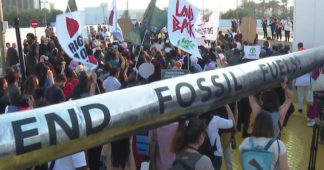By Climate Scientist
Dec 18, 2023
COP28, the climate summit that ended last week, delivered nonbinding words. What humanity and the Earth need is determined, coordinated action to end fossil fuels, and the useless words from COP28 will only serve to delay that action.
Let’s review what just happened. Some wealthy humans flew on private jets to the United Arab Emirates, a petrostate, for a two-week meeting. Many of these humans work for the fossil fuel industry. The petrostate leveraged its host status for dirty side deals to expand fossil fuels. There was a session on sustainable megayacht ownership. The presiding official was a fossil fuel CEO, Sultan al-Jaber, who, days earlier, had said some anti-science, denialist garbage-words. Two days after the meeting ended, he promised that his oil corporation will continue investing in oil and expanding fossil fuels. OPEC, in a joint statement with the Gas Exporting Countries Forum, congratulated the UAE on the “positive outcome” for the fossil fuel industry.
Nice “climate summit.”
We are all in grave danger from global heating, which appears to be accelerating, is irreversible, and is driving all the flooding and heat and fires. It’s caused almost entirely by the fossil fuel industry, with industrial animal agriculture in second place. If we allow these industries to continue, Earth will get hotter and hotter; and more and more systems (food, water, marine and terrestrial ecosystems, geopolitics) will break all over the world. The longer these industries exist, the more we will lose.
The wealthy fossil-fuel-industry-influenced humans at COP28 produced 21 pages called the “global stocktake.” The stocktake mentions “fossil fuels” once, on page 4. People who wish to argue that COP28 wasn’t a complete failure have been calling this “historic.” And technically it is, because fossil fuels have never been mentioned in a COP decision text.
However, this is shameful. Thirty years? To simply mention the dead-obvious cause of this global heating nightmare? Specifically, the stocktake “calls on” nations to contribute to “transitioning away from fossil fuels in energy systems, in a just, orderly and equitable manner.” These words are nonbinding, stop short of calling for phasing out fossil fuels, and limit the transition to “energy systems.” I’m surprised the rich folks mentioned “equitable”; perhaps they are beginning to feel pressure from the climate movement. Indeed, any fossil fuel phase out will need to be equitable—even apart from the obvious moral imperative—or its policies and treaties will unduly burden non-rich people and nations, become massively unpopular, and fail (this dynamic was colorfully demonstrated by the Yellow Vests movement in France in 2018). However, the rich seem unlikely to voluntarily relinquish their wealth. If they don’t, the transition will take a revolution.
The stocktake also included words encouraging expansion of “transitional fuels,” which means fossil gas (what the industry calls “natural gas”); words cheerleading acceleration of carbon capture and storage, which is a fossil fuel industry techno-fantasy that will never happen at scale; and words calling for “phase-down of unabated coal power,” which means phase-down of coal power with carbon capture (abated coal power) isn’t on the table. The use of unabated in this context makes it clear that, in the worldview of COP28 and the fossil fuel industry, “carbon capture” are merely words that mean “we can keep burning fossil fuels.” The stocktake also fails to mention industrial animal agriculture at all.
Continue reading at www.newsweek.com
We remind our readers that publication of articles on our site does not mean that we agree with what is written. Our policy is to publish anything which we consider of interest, so as to assist our readers in forming their opinions. Sometimes we even publish articles with which we totally disagree, since we believe it is important for our readers to be informed on as wide a spectrum of views as possible.











